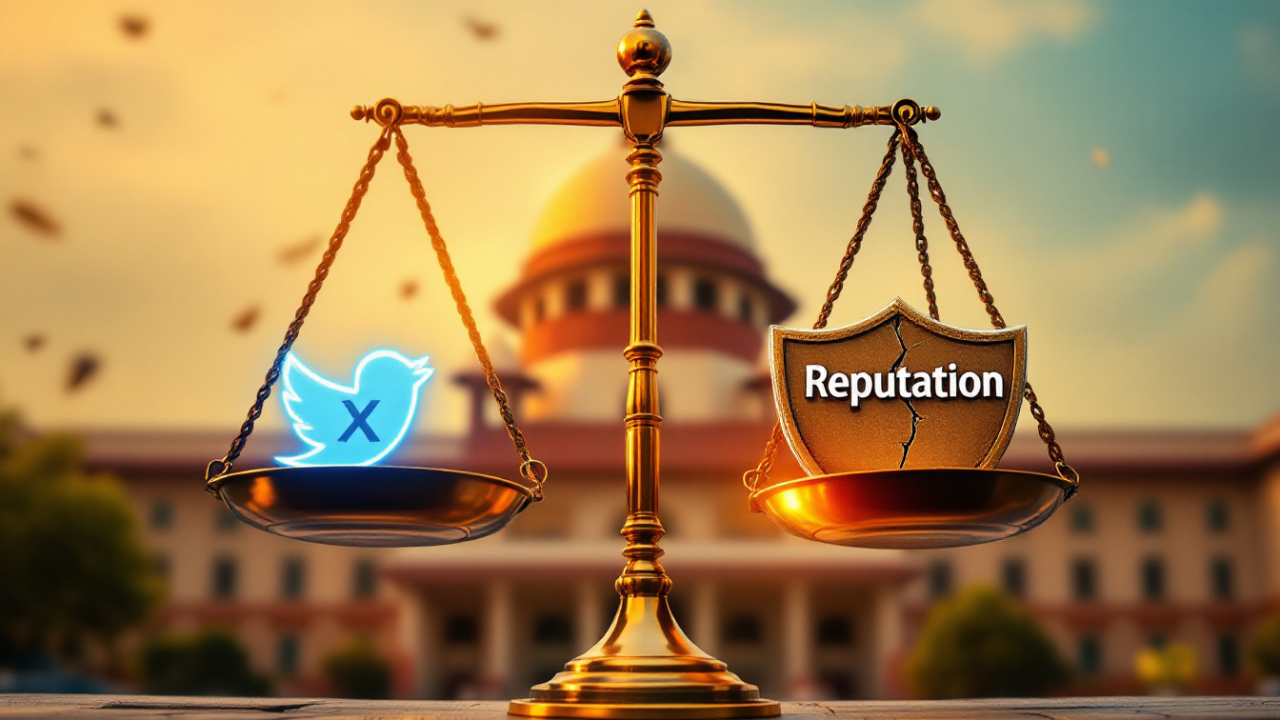🔍 Introduction: When Online Opinion Meets Offline Litigation
Can a tweet ruin a reputation?
In the age of X (formerly Twitter), where expression is instant and visibility is global, Indian courts are increasingly being asked to decide when criticism becomes Defamation.
The Delhi High Court in CS (OS) 570/2024: Addictive Learning Technology Ltd. & Ors. vs. Aditya Garg & Ors. (Decided on 20 February 2025) has answered this with remarkable clarity. The Court rejected a defamation suit filed over tweets, emphasizing social media's conversational, fast-paced nature and reinforcing key principles of freedom of speech under the Indian Constitution.
🧵 Background of the Case
Plaintiffs, including the company behind the popular online legal education platform LawSikho, sued several individuals, most of them alums of National Law Universities (NLUS) or anonymous Twitter users, for allegedly defamatory tweets in response to a Lead Tweet by Plaintiff No. 2 criticizing NLUS and their placement outcomes.
The Plaintiff's Lead Tweet called NLUS "rent-seeking institutions," accused them of brainwashing students into "leftist cults," and claimed their graduates were "unemployable." Unsurprisingly, this tweet provoked heated rebuttals from law professionals online—some of which were sarcastic, others bluntly critical.
The Plaintiffs alleged that these response tweets damaged their reputation and affected investor confidence, especially as Plaintiff No. 1 is a publicly listed company.
🧑⚖️ Key Legal Questions Before the Court
1. Do the tweets by the defendants amount to actionable civil Defamation?
2. Is there any real injury, or is the suit based on perceived hurt?
3. Can tweets be read in isolation, or must they be read as part of interactive conversation threads?
4. Did the plaintiffs provoke the reactions they later called defamatory?
5. Should the plaintiffs have used remedies under IT Rules 2021 before filing suit?
⚖️ The Court's Ruling: What It Said and Why It Matters
1. 🧵 Context Matters: Tweets Are Not News Headlines
"Tweets are part of conversation threads, not isolated articles. You cannot cherry-pick one tweet and call it defamatory when it was a reply to your provocative statement." – Justice Manmeet Pritam Singh Arora.
The Court ruled that each tweet must be interpreted in full context, particularly when part of a social media thread. The plaintiff's tweet criticising NLUS was provocative and deliberately invited engagement, akin to "proactive trolling".
2. 🛡️ Opinion is Not Defamation
Referring to Supreme Court and High Court precedents, the judgment clarified that:
- Opinions, even if harsh, are protected under Article 19(1)(a) of the Constitution.
- No defamation exists unless substantial injury to reputation is proved.
- "Feeling insulted" is not a valid basis for a defamation claim.
3. ⚙️ IT Rules 2021: First Line of Remedy
The Court emphasized the Information Technology (Intermediary Guidelines and Digital Media Ethics Code) Rules, 2021, which provide a time-bound mechanism for users to complain to the Grievance Officer of social media platforms (like X/Twitter) about abusive or defamatory content.
Observation:
"The Plaintiffs did not approach the Grievance Officer under Rule 3(2) or file an appeal under Rule 3A. This shows they didn't believe in the seriousness of the tweet until much later."
4. 🔨 Vulgar Abuse ≠ Defamation
Some tweets were undeniably rude. But the Court drew a firm line between:
- Defamatory statements, which lower someone's moral or professional character in the eyes of others
- And "mere vulgar abuse", which is offensive, but not legally actionable
Anonymous users calling the plaintiff "a loser" or "a prick" was deemed non-actionable vulgarity. The Court cited UK precedents (e.g., Vine v. Barton, Smith v. ADVFN Plc) and Indian cases (Major General M.S. Ahluwalia v. Tehelka.com) to support this.
5. 🧠 Trolling and the Psychology of Online Provocation
The Court went a step further by referencing academic literature, particularly a 2023 SAGE study titled Online Trolling: A New Typology, which outlined:
- Proactive trolling: Posts meant to provoke emotional reactions and increase follower count
- Reactive trolling: Response tweets meant to defend one's identity, institution, or dignity
By applying this modern understanding, the Court framed the Lead Tweet as an example of proactive trolling, and most response tweets as reactive.
💡 What This Judgment Means for You
🧑⚖️ For Legal Professionals:
- A new benchmark for evaluating online defamation claims
- Affirms the importance of context, tone, and timing in digital speech litigation
- Underscores the need to exhaust IT Rules 2021 remedies before approaching civil courts
🧑💻 For Content Creators, Founders, and Influencers:
- If you initiate controversial debates online, you can't always cry Defamation when people respond critically
- The right to reputation does not override others' right to disagree
📱 For Social Media Users:
- Harsh opinions ≠ defame
- Be aware of how you engage, but also know your freedom to express honest views is protected
🧾 Judgment Summary
🧑⚖️ CS (OS) 570/2024: Addictive Learning Technology Ltd. & Ors. vs. Aditya Garg & Ors.
📅 Decided: 20 February 2025
👩⚖️ Judge: Hon'ble Justice Manmeet Pritam Singh Arora
⚖️ Held: Suit rejected under Order VII Rule 11(a) CPC
💸 Costs: ₹1,00,000 imposed on plaintiffs
✍️ Final Thoughts
This judgment reaffirms that law must evolve with technology, and courts must read online content not with legal rigidity, but with realistic awareness of how digital platforms function.
Freedom of speech is not just about saying what's popular—it's also about defending the right to disagree, especially online.
🗨️ What are your thoughts on this landmark decision?
Should social media users be more careful with their words, or should we protect the right to "say it as it is"?

